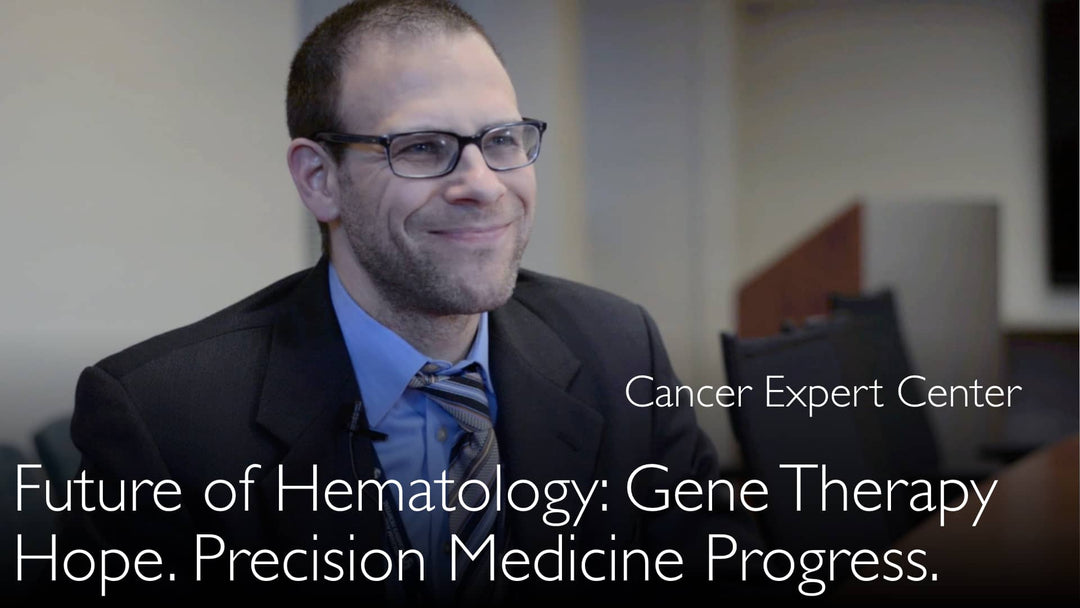Leading expert in hematology and oncology, Dr. Aric Parnes, MD, explains the rapid evolution of blood disease treatments. He highlights the central role of genomics in transforming diagnosis and therapy. Dr. Aric Parnes, MD, discusses the immense promise of gene therapy for conditions like myelodysplastic syndrome, while also detailing the technical challenges that remain. He emphasizes that a medical second opinion is crucial for confirming diagnoses like thalassemia and ensuring patients receive the best available treatment.
Future of Hematology: Genomics, Gene Therapy, and Advanced Blood Disease Treatments
Jump To Section
- Genomics Revolution in Hematology
- Gene Therapy Promise and Challenges
- Myelodysplastic Syndrome Advances
- Role of a Medical Second Opinion
- The Future of Hematology Treatments
- Full Transcript
Genomics Revolution in Hematology
Genomics is a primary driver of change in modern hematology. Dr. Aric Parnes, MD, identifies hematology as a founding specialty of the genomics transformation in medicine. This shift provides a deep molecular-level understanding of blood disorders that was previously impossible.
Advanced genetic diagnostic tests, like the Rapid Heme Panel, are a direct result of this progress. This test allows physicians to quickly and affordably screen for 95 genetic mutations common in blood cancers and other hematologic diseases. Dr. Anton Titov, MD, notes that this molecular understanding is fundamentally changing patient care.
Gene Therapy Promise and Challenges
Gene therapy holds significant promise for creating breakthrough treatments in hematology. Dr. Aric Parnes, MD, is hopeful that gene therapy will soon become a major player in treating blood diseases. However, he clarifies that its clinical success has been limited thus far due to significant technical hurdles.
Key challenges include finding the right viral vector to deliver therapeutic genes effectively. A critical safety concern is ensuring the genetic vector inserts into the patient's genome in the correct location. Incorrect insertion can potentially cause leukemia as a serious side effect, which has historically stalled progress.
Myelodysplastic Syndrome Advances
Myelodysplastic syndrome (MD S) exemplifies the progress fueled by genomics. Dr. Aric Parnes, MD, contrasts the past's limited understanding with today's detailed molecular pathophysiology. This deeper knowledge directly informs how to alter the disease's progression and treat patients more effectively.
The transformation in MD S care is a model for other hematologic fields. Dr. Anton Titov, MD, discusses how this rapid advancement at the molecular level is happening now in hematology, positioning it at the forefront of medical innovation.
Role of a Medical Second Opinion
A medical second opinion is a vital step for patients with complex blood disorders. It is crucial for confirming that a diagnosis of anemia, leukemia, or thalassemia is correct and complete. Dr. Aric Parnes, MD, and Dr. Anton Titov, MD, both emphasize its importance in the diagnostic process.
Furthermore, a second opinion helps ensure a patient receives the best possible treatment plan. This is especially true for rare conditions like thalassemia and myeloproliferative diseases, where treatment strategies are rapidly evolving. Confirming the treatment plan provides patients with confidence in their care pathway.
The Future of Hematology Treatments
The future of hematology is focused on precision medicine and advanced treatments. Dr. Aric Parnes, MD, anticipates that the coming decade will see gene therapy finally fulfill its long-held promise. Ongoing clinical trials are actively working to overcome current technological barriers.
This progress means advanced hematology treatments will become available to more patients worldwide. The field's complexity, sitting at the crossroads of many medical specialties, fuels its rapid innovation. Dr. Anton Titov, MD, concludes that these exciting directions will continue to improve outcomes for patients with blood diseases.
Full Transcript
Dr. Anton Titov, MD: When will gene therapy fulfill its promise in the treatment of blood diseases?
Dr. Aric Parnes, MD: Medicine in general has been a very exciting field to be in, and hematology in particular. Hematology is one of the founding specialties of the genomics transformation. It is exciting to see how hematology is changing so quickly.
For example, we had a very limited understanding of myelodysplastic syndrome before. Now we understand the pathophysiology of myelodysplastic syndrome at a molecular level. We also understand how myelodysplastic syndrome affects patients. We understand what we can change about myelodysplastic syndrome progression and how to treat patients.
This rapid advancement of understanding disease at a molecular level is going to happen in all fields of medicine, but it is happening right now in hematology.
Dr. Anton Titov, MD: Where do you see the most exciting directions in hematology, non-malignant hematology in particular?
Dr. Aric Parnes, MD: Certainly genomics is the big factor in hematology, because genetic changes are a root cause of many hematologic diseases. I am hopeful that gene therapy will be a big player in hematology soon.
Gene therapy has not been very successful yet. There were problems with gene therapy technology in the past. Some of the problems with gene therapy were about finding the right vector to get the therapeutic gene into the body in the right method.
There were problems in gene therapy to make sure that the genetic vector inserts in the right space in a patient's genome. Correct insertion of the genetic vector is necessary so that it does not cause leukemia as a side effect.
Gene therapy has been a challenge to hematology advancement. There are ongoing clinical trials in gene therapy in hematology. We are actually hoping to be part of one clinical trial in gene therapy soon.
But gene therapy has a long way to go. Gene therapy will eventually realize its promise of breakthrough treatments for hematology patients.
Dr. Anton Titov, MD: Dr. Parnes, thank you very much for this very interesting conversation about exciting topics in hematology. We discussed many topics about frequent hematology diseases.
Thank you very much for sharing your views and your expertise in hematology with us! I hope that our viewers will also find our conversation about hot topics in hematology very useful.
Dr. Aric Parnes, MD: Thank you for allowing me to participate!




